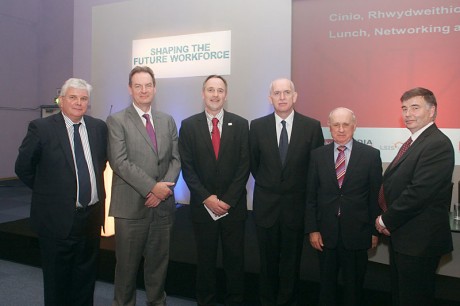
Training Provider Focus On Shaping Wales’ Future Workforce
Driving up demand for apprenticeships, getting more employers to invest in training and setting out a clear vision on how training providers will deliver the skills required by the Welsh economy were the key themes of a major conference held in North Wales.
The National Training Federation for Wales (NTfW), a network of 116 quality assured workplace learning providers, held its annual conference, ‘Shaping the Future Workforce’, over two days at Venue Cymru, Llandudno, where Deputy Minister for Skills Jeff Cuthbert announced £5 million extra funding for apprenticeships.

Mr Cuthbert, NTfW chief executive Arwyn Watkins, Wales Commissioner to the UK Commission for Employment and Skills, Scott Waddington, Skills Champion for Wales, Barry Liles and Huw Evans, chair of Project Board for the Review of Qualifications 14-19 in Wales, all threw down challenges to training providers.
The need for a culture change so that apprenticeships are held in higher esteem and seen as an investment rather than a cost and a solution to literacy and numeracy problems in schools were talking points. However, the main thread over the two days was for skills to be matched more closely to the needs of employers by working in collaboration.
“With so much change on the horizon in education and training, it is critically important that we set out a very clear vision for the federation and publish our aims to secure relevant and appropriate skills that are required by the Welsh economy now and in the future,” said Mr Watkins, who NTfW members to rise to the challenges.
He called on the NTfW board to consult with members and stakeholders before publishing its aims to secure a robust education and training system for Wales.
“There is an abundance of evidence about future skills needs, what works well and, most importantly, what action must be taken to make things better,” he said. “Now is the time to secure an education and training system for Wales that delivers with confidence and ambition the skills the economy needs to succeed.”
Announcing the extra funding for additional apprenticeship places for newly recruited young people aged 16 to 24, Mr Cuthbert challenged the work based learning network to engage with those employers who do not already offer apprenticeships.
“I am committing this additional £5million to help those young people who are struggling to find employment at this time,” he said.
“I challenge the Work Based Learning Network to engage with those employers who are not already providing apprenticeship delivery. I want them to know the benefits of apprenticeships, know that they are at the heart of business effectiveness, that they increase the skill set of the nation and they increase the attractiveness of Wales as a place to do business.
“In today’s market an apprenticeship holds as much value as a place at a top university, but it is only by raising the value and profile of apprenticeships that they will gain the parity of esteem with more traditional academic routes.”
The mission facing Wales Commissioner Mr Waddington, who is also chief executive of Cardiff-based SA Brain and Co Ltd, is to get more employers to invest in the skills of their people to drive up enterprise, jobs and growth.
The UK Employer Skills Survey, published in May, revealed that more than 40% of businesses in the UK did not invest in training over the past year.
“There is compelling evidence that businesses that don’t train their staff are twice as likely to fail as those that do,” said Mr Waddington. “Businesses that invest in skills not only improve their bottom line but also the health of the nation.”
The UK Commission was questioning why people don’t have the skills needed by employers to support business growth.
“There are radical proposals for England on Apprenticeships and other vocational training to award grants and loans direct to employers, rather than via providers,” said Mr Waddington. “These grants or loans would be matched by investment from employers.
“Although there is pressure for Wales and other nations to follow suit, we are observing intently from the sidelines at this stage.”
Huw Evans, chair of the project board reviewing all qualifications in the 14-19 age range in Wales, said a major report with recommendations would be released on November 28. The aim was to get qualifications that were understood and met the needs of young people and the economy.
“We are reviewing all qualifications in the 14-19 age range and that gives us an opportunity to do things slightly differently within Wales,” he said. “Colleges, universities and experts in the field need to be involved much more in developing qualifications.
“We think there is a need to redress the balance between vocational and academic qualifications. If we don’t adopt a balanced approach, we will be letting a lot of young people down within Wales.
“There also needs to be a collaborative network so that all institutions can work together, drawing on their mutual strengths, to deliver what is required.”
Mr Liles spoke about the value of world class skills competitions in driving up the standard of not only young people but also training providers in Wales. He encouraged training providers to get involved in skills competitions at all levels.
More News Articles
« Best In Wales Celebrate At Awards Ceremony — Students and apprentices fly the flag for Team Wales at top UK skills show »

